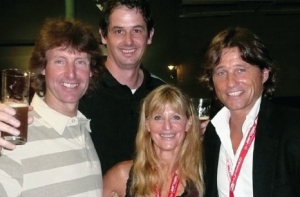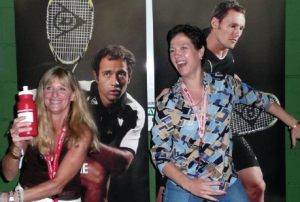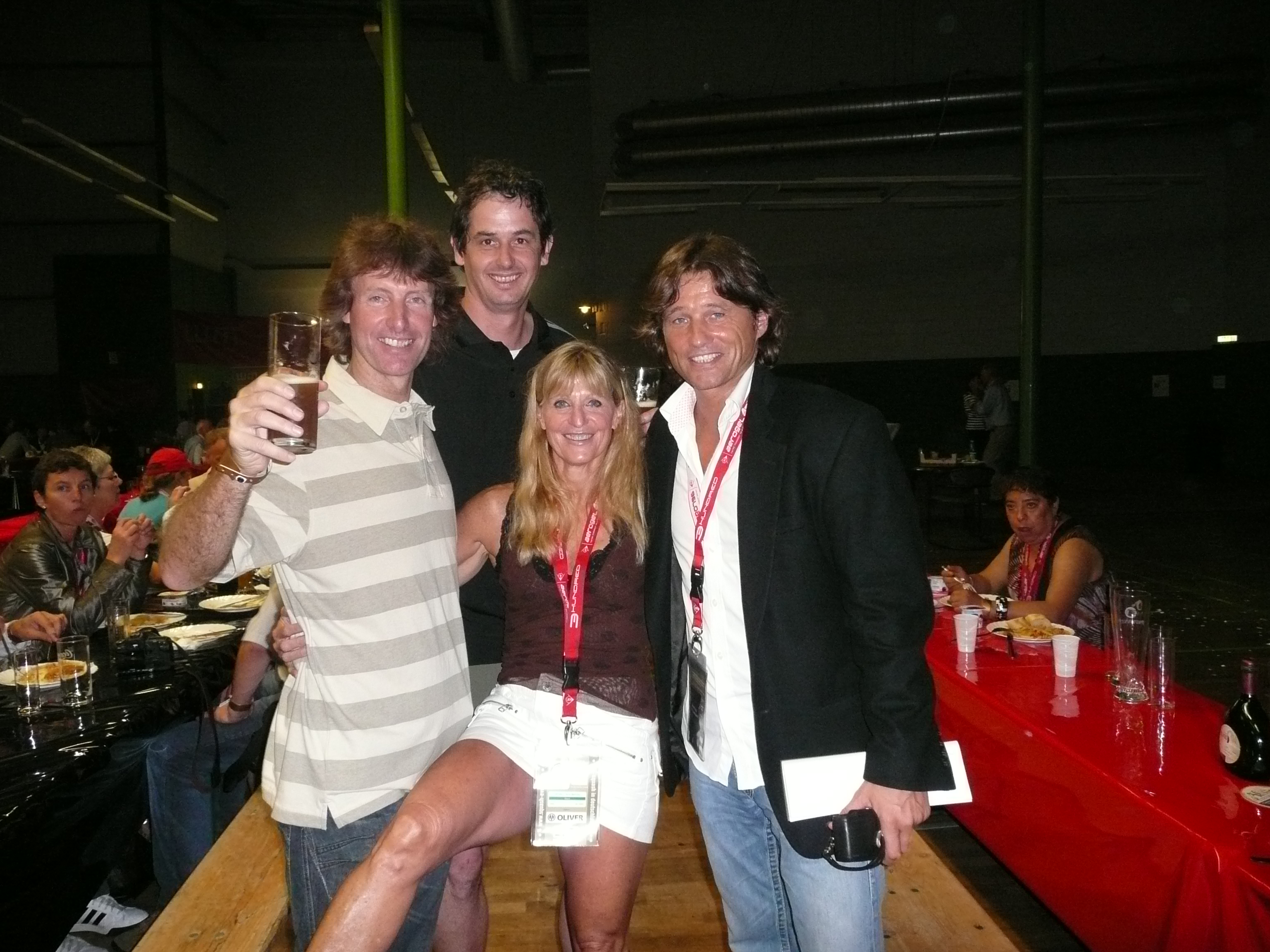By Jane Segall and Jen Gabler
When I get older losing my touch
Many years from now
Will I still be hitting backhand drops,
Cross-court volleys, nicking my shots.
If I stay out till quarter to three,
Would you lock the door?
Will you still beat me?
Will you still seed me?
When I’m sixty-four!
I will beat my mum when I’m ten”… says seven year old Simon of the “never say die” Jane Segall. Those that know Jane on the squash court, think this would be an apt statement coming from her son.
For those that don’t know Jane Segall off the squash court, she was born and raised in the South African surfing capital Durban, which boasted a decent squash community, but she wasn’t a squash player back then. Jane’s first love was horses and by the time she was 15 years old, she had won two Junior South African Show Jumping Team Championships. She then quit riding competitively to “see the world” and broaden her horizons by moving to Amsterdam for a year, which was an eye opener for a 16 year old coming from the confines of an apartheid governed country, where in some provinces you couldn’t wear a bikini in a public pool on Sundays. Returning home (her mum was worried she wouldn’t come back), she enrolled at the University of Natal, Durban campus, and began her second sport in earnest. Field hockey was a game she’d started playing as a seven year old in primary school. On the intercollegiate team, she discovered two things. First, she could always outrun her opposition and second, she never got tired. Two aspects that still serve her well today on the squash court.
The third discovery and important especially now that she is fifty-four (a “granny” on the court, according to her) is her ability to very quickly analyze her opponents’ strengths and weaknesses. “I didn’t realize that I was subconsciously doing this every time I stepped on the court and this ability seemed to become more obvious to me when I was in a hole, usually when I was down two-zero and sometimes match point. As I played more tournaments I began to rely on this ability and pulled out many a win that most observers would have bet against.”
Jane credits her father, a world class racing car driver (pre-Formula One) as the person who gave her this ability as professional racing required the use of sharp wits at all times.

“Starting at five years old, my father was my coach. In South Africa, we had an annual Sports Day in school with personal prestige very much on the line. My dad’s knack in analyzing a race was especially evident when it came to the potato and the sack races. I was the first girl in my primary school to win these two races every year without fail, even though I was much smaller and younger than my competition. In the sack race, while all the other girls hopped like bunnies to the finish line, I ran with my feet, one in each corner of the sack and thus “outran” my competitors. In the potato race, six potatoes were lined up in a single row with a bucket in front. The goal was to place all the potatoes in the bucket and hit the finish line first. All the other girls would pick up the potato closest to the bucket. My father would make me go to the furthest potato first and once again his theory proved successful. Of course he had a very willing pupil. His coaching ability followed me into my show jumping competitions and continues this day in my squash matches.
Jane took up playing squash late in life. When she moved to New York City in her early 20’s, she was taken to the Uptown Racquet Club. But it didn’t remotely look like any squash club that Jane had ever seen before. Wrong sized court, wrong lines, wrong ball, wrong scoring. So she dabbled around with a squash ball, more for exercise than the love of the game until she moved to Los Angeles in the 1980s. There she found a bunch of players who only played “softball,” and so she began to play. In the late 80s, Jane entered her first Softball Nationals. “I was crushed first round by Carole Dicker. But I loved playing squash and thus my third sport was born.”
“I have never stopped enjoying the thrill of the competition, knowing that I live or die by my own sword. Both my other sports involved more than just myself. Squash is an ‘only and lonely’ sport, especially since you have no-one else to rely on but yourself. Many a pro has tried to change my strokes and failed miserably. Adam Walker, a pro at our club a few years back, once told me that I had the worst strokes of all the women in my club, which I knew by the way, but I also knew that I had an uncanny ability to ‘win ugly’ as Brad Gilbert (Andre Agassi’s former coach) put it in his book.”
Her athleticism and ability to analyze opponents has led Jane to one Gold and two Silver Medals at the Maccabiah Games in 1993 and 1997, five National Age Group titles, a few dates with Paul Assaiante before he became Trinity’s most winningest coach in college sports history and two Howe Cup titles (the most recent Howe Cup win in November 2010).
2010 has been an exciting and different year for Jane. For one, her seven year old son Simon has taken to squash and seems to have that same “do or die” spirit on the court as his mum. At the Nationals in Newport in March 2010, he would hop on any empty court and hit balls to himself. Also at the Nationals, Jane found out about the World Masters Squash Championships being held in August 2010 in Cologne, Germany, from the master of court strategy himself, the one and only Richard Millman.
“I have known Richard for a long time and always wanted his squash tips at the Nationals which I never got, and I fully understand why, because his wife Pat and I have met in the finals of the Nationals at least three times with the outcomes luckily in my favor. I was very intrigued upon hearing about the World Masters in Germany but couldn’t find any information about it on our US Squash website. This saddened me because the US had the worst showing of any super power at the World Masters Games. We need to do a better job of advertising world class masters events like this. There were 797 players from all over the world and only eight from the US. I think we could do very well since we have fabulous players like Jay Nelson, Chris Burrows and Juliana Lillien to name a few.”

“The World Masters was amazing for many reasons but two stood out. First, that squash outside the US reaches all socio-economic levels and it was a pleasure to see players from all walks of life coming from all ends of the earth to compete. There was even a man (Wolfgang/Yvonne going through a change of gender) playing in woman’s clothing in the men’s’ 55+ draw. He drew a huge crowd of supporters. Unfortunately he lost to a Scotsman, who didn’t wear his kilt on the court but did wear it to the party afterwards. And Marie Vlcek and I never did get our answer to the underwear question.”
“The second and most compelling difference to me was the calling of lets. The referees in Europe were much stricter about giving out Lets. They firmly adhered to the rule that unless there was a material difference to a play, you had to make every effort to play the ball. The reality felt like a game of “no let” or “stroke.” Once I got used to playing with some bodily contact, I liked the difference. Much less stopping and starting in a match.”
“I never train for squash tournaments, but I did for World Masters. Mostly cross training to get stronger and fitter. I spent six weeks taking Zumba, Pilates and Yoga classes. Three weeks before Cologne, I started playing squash four times a week. I didn’t know what to expect but I didn’t want to get stale or peak too early. I had heard that the level of competition was very high with lots of former tour players in the draws. My only wish was not to play the first seed/current World Champion in the first round. Well my wish was granted…sort of.
“We had a two stage draw. I was in a box with the current world champion and number one seed from England. I had heard she was a fantastic player with a flamboyant style who chopped her opponents without much mercy. My match against her was a match like no other I have ever played in my entire squash life. The international players play close to each other. By accident, I hit the world champ in the mouth on the second point of the first game, and unfortunately her gum started to bleed. We broke for 20 minutes to stop the bleeding and thereafter she regarded me a the pariah of the squash tournament. But what struck me the most, was her poor sportsmanship on the court. She pushed, pulled and bumped me. She never stopped muttering under her breath, hurling obscenities, putting down my game and exploding at the referee when I asked for a let or if she thought she got a bad call. So what was the end result of this hour and a half match? I was down one-two and then tied it up at two-all. When I tied it up in the fourth, I felt I had the edge. In the fifth, I went up two-love immediately, but I didn’t have enough fluids on board and got a cramp in my left calf. Thus my running game came to an abrupt halt and I lost in the fifth. But I was happy. I had played with my heart, never let my opponent rattle me, kept close to toppling her and learned a lot.”
“What I took away from the tournament was a fabulous experience. That I was as fit as the rest of the top players, quicker to the ball than most of them, but not aggressive enough when opportunities came my way.
These players attacked the ball whenever possible and never left the door open. I was very fortunate to have the coaching of Dominic Hughes and Trevor Wilkinson, both world class players and very helpful with constructive comments on how to improve my game.” Jane is looking forward to the World Masters in Birmingham, England, in Summer 2012 and hopes that more US masters players will go to this tournament. As Jane says in her usual spirit, “C’mon everyone, let’s get a group together and paint England red, white and blue.”


